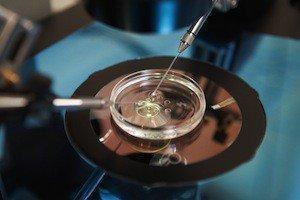Legal Battle over Frozen Embryos
 A well-known actress is currently at odds with her ex-fiancé regarding frozen embryos the couple created before parting ways. The ex-fiancé wants to implant the embryos in a surrogate. However, the actress, who is currently engaged, wants them frozen indefinitely.
A well-known actress is currently at odds with her ex-fiancé regarding frozen embryos the couple created before parting ways. The ex-fiancé wants to implant the embryos in a surrogate. However, the actress, who is currently engaged, wants them frozen indefinitely.
If a petition is granted, what rights and responsibilities would the actress have regarding child custody and child support?
Illinois Law Regarding Embryos
The use of fertility treatments to aid couples who cannot conceive spontaneously is increasingly common. One popular method is in-vitro fertilization, a method where egg and sperm are joined in a lab and are then implanted into the woman. During in-vitro, many pre-embryos are created at one time; those that are not implanted are either destroyed, donated or frozen indefinitely.
A case similar to the actress' is now being hard before the Illinois Court of Appeals. The couple at the center of this battle created pre-embryos several years ago, when the woman underwent cancer treatment. The couple later broke up, and the woman sought to use the embryo in an attempt to have a child. The man protested, arguing that the couple had signed an agreement stating that nothing would be done with the pre-embryos without the consent of both parties and that he had no desire to have a child.
This is a case of first impression in Illinois, although it has been decided in other states with mixed results. Courts sometimes take a contracts approach and look to whether a couple entered into any type of written agreement regarding who controls the embryos and whether or not both parties must consent to their implantation.
In this case, the couple had a contract with a clinic stating that the parties had equal rights to the embryos — they could neither be implanted nor destroyed without the consent of both parties. However, the Judge ruled that this was a contract between the parties and the clinic, not the parties themselves, and awarded “custody” to the woman who testified that her cancer treatments left her unable to have a biological child by any other method.
The appellate Court overturned the decision, stating that in the absence of a contract the Court must use a “balancing approach,” which weighs the needs and desires of both parties. Again, the trial Court ruled in the woman's favor, this time finding that there was a verbal agreement between the parties that was sealed into a binding contract when the “father” delivered his sperm to the fertility clinic. Additionally, the Court found that the woman's desire to have a biological child, when this was the only available method (her cancer treatments made harvesting an egg impossible), outweighed the man's desire not to become a father.
An appeal from that decision is what is currently being decided by the Court. What adds an interesting dynamic to this case is the fact that both parties testified that while fertility treatments were going on, neither of them believed that the relationship was a lasting one. This changes things a bit from the case of the actress; there, the each party created the embryos as a couple that believed their relationship would last — they wanted to raise the children together. Here, there was no expectation of a lasting relationship, and the topic of fertility treatments came up only when the woman was diagnosed with cancer, as a way to preserve her ability to have a biological child. This fact could change the nature of the Court's analysis.
At issue is whether or not a man can be forced to have a biological child against his will. Even though the woman would raise the child alone, does she have the right to put the father's biological DNA into the world against his wishes? Other Courts have ruled in the father's favor. But in this case, with the father clearly admitting that he had no expectation of a lasting relationship, and with fertility treatments occurring in direct response to cancer treatments, the Court may find him to be no more than a sperm donor. He may therefore not have any say in how the embryos, created with his sperm, are used. Additionally, he may not have have any rights to the child.
Palatine Family Law Attorney
Family law cases can be emotional. However, Nicholas W. Richardson has helped thousands of people navigate emotional times with compassion, integrity, and understanding for more than 10 years. If you are facing divorce or child custody, please contact skilled Palatine family law attorney Nicholas W. Richardson today to schedule your free initial consultation.
Introducing The Law Office of Nicholas W. Richardson
Nicholas W. Richardson is an experienced divorce lawyer and mediator whose comprehensive legal knowledge, commitment to clients and reputation for results bring lasting solutions to your problems.






